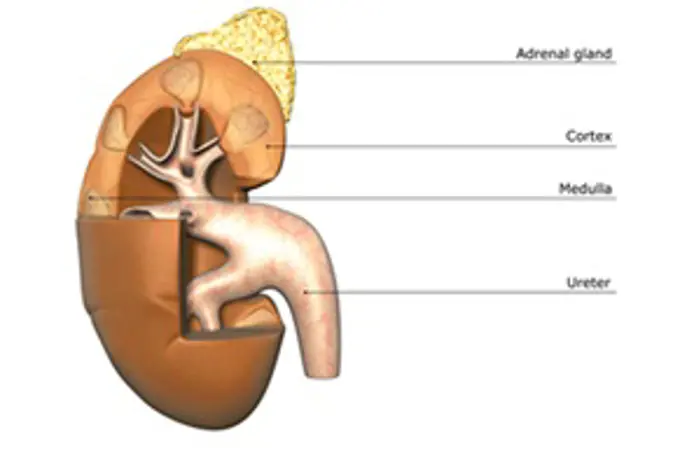Where are my kidneys?
The kidneys are bean-shaped organs approximately 6 cm wide and 12 cm long and consist of two main layers – an inner layer called the medulla and an outer layer called the cortex. Most people have two kidneys that are situated at the back of the abdomen (tummy) on either side of the spine.

Graphic showing a section through the right kidney with the main structures labelled.
What do the kidneys do?
The kidneys have a number of roles in the body;
- The kidneys ensure that the make-up and volume of fluids in the body is correct.
- They help control the chemical balance of the blood and regulate the body's level of sodium, potassium and calcium.
- The kidneys remove waste products and excess water from the body and so help to regulate blood pressure.
- They activate vitamin D, which helps to maintain strong bones.
- They produce erythropoietin, a hormone that is vital for the production of red blood cells.
Each kidney contains 1.0–1.5 million small tubes called nephrons. The kidneys filter blood through a network of small blood vessels called the glomerulus. This produces a solution that then flows through the nephrons. As this fluid passes through the nephron, substances that the body wants to retain (such as sodium, potassium, proteins and most of the water) are re-absorbed back into the blood. The substances that need to be removed from the body, such as waste products, including the remains of drugs and alcohol, are retained in the fluid and removed from the body in the form of urine. The kidneys filter blood daily and produce between one to two litres of urine.
What substances do the kidneys make?
The kidneys make hormones such as erythropoietin and activate the hormone vitamin.
Vitamin D is essential for a number of different functions in the body. Most of the vitamin D that is in the blood is inactive and it is modified by the kidney and other tissues to activate it. Active vitamin D stimulates the uptake of calcium from food, is important for the maintenance of healthy bones and also helps to regulate the response of the immune system to infection.
Erythropoietin is produced when oxygen levels in the blood are low. It acts in bone marrow to stimulate the production of mature red blood cells, to maintain healthy oxygen levels in our tissues.
The kidneys also produce prostaglandins, hormone-like substances, made from lipid (fat). The kidneys produce renin, an enzyme that plays an important role in controlling blood pressure. In addition to making hormones, the kidneys also respond to a number of hormones including vitamin D, aldosterone, prostaglandins, cortisol, parathyroid hormone and calcitonin.
What could go wrong with the kidneys?
When the kidneys are not working correctly, waste products and excess fluid can build up. The levels of sodium, potassium, phosphate and calcium are also not regulated correctly. When the levels of these substances and waste products are not well regulated, their levels increase in the body. These accumulations cause the symptoms of kidney disease, which can include high blood pressure, excessive tiredness, fluid retention and possibly lower back pain.
Kidney damage can be caused by several reasons – diabetes, high blood pressure, infections, chemicals such as medications and drugs, severe dehydration, severe heat stroke and diseases that affect the glomerulus. The kidneys also need an adequate supply of blood, so if there is something wrong with the blood vessels to the kidney, such as a narrowing, this will prevent the kidneys from working efficiently.

